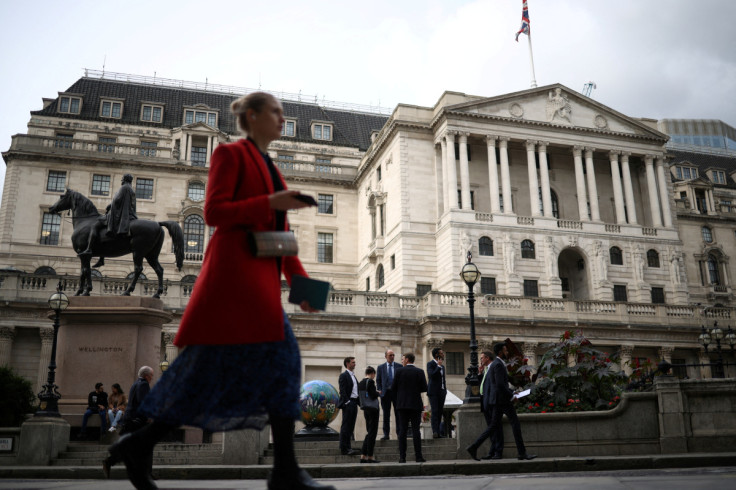UK inflation sucker-punches the BoE, while sterling bulls cheer
Bank of England policymakers will not have looked at Wednesday's inflation data with the same enthusiasm as sterling traders, who took advantage of a shock jump to push the pound up, confident that a rate hike this week is now a done deal.

Bank of England policymakers will not have looked at Wednesday's inflation data with the same enthusiasm as sterling traders, who took advantage of a shock jump to push the pound up, confident that a rate hike this week is now a done deal.
British consumer price inflation (CPI) rose to 10.4% in February from January's 10.1%, above all economists' forecasts in a Reuters poll and almost back to where it was in December.
Markets now see a near 100% chance of the BoE raising rates to 4.25% from 4.0% on Thursday, firming from a roughly 50/50 chance earlier this week of policymakers doing nothing in light of the crisis of confidence that has rocked the global banking sector.
The rally in sterling, last up 0.45% at $1.227, and a 25 basis point jump in two-year government bond yields were further signs that investors now expect an imminent hike.
While a fall in energy prices is positive in the longer run, prices elsewhere have risen. The problem, said Ben Nicholl, a fund manager at Royal London Asset Management, is "inflation in all the wrong places".
Core inflation, which strips out food and energy, rose by 6.2% in February, far above the median forecast of an easing to 5.7% in the Reuters poll.
"Core CPI missed by 0.5% - that's one of the biggest, if not the biggest misses on CPI in the recent series of inflation data. So it's a shocker for the Bank of England, particularly given they've been so dovish in their recent messaging," Nicholl said.
The cost of food and non-alcoholic drinks rose 18.0% - the most in more than 45 years, while the 12.1% annual rise in inflation at restaurants and hotels was the biggest since 1991, according to Japanese bank Nomura.
Britain has had the highest inflation among Group of Seven nations with persistent price pressures affecting longer-lasting components such as services and wage growth.
"The UK will be obliged to continue to hike rates," Francois Savary, chief investment officer at Prime Partners, said.
"They are in the worst situation you can find among developed economies. The UK has a significant inflation issue and growth has not returned to pre-pandemic levels," he said.
WHAT GOES UP
Britain's two-year gilt yield shot up to 3.5%, set for its biggest one-day jump since October when Britain's financial markets were reeling from former Prime Minister Liz Truss' "mini-budget".
That reflects investors' belief that rates still have room to rise, even if the UK's independent watchdog last week forecast inflation will drop towards 3% by year-end.
Rate futures indicate the Bank Rate peaking at 4.5% or 4.75% in mid-2023 but little chance of it hitting 5% as had been the case earlier this month.
UK mid-cap stocks, closely linked to the health of the underlying economy, were among the poorest performers in the European equity market on Wednesday, dropping 0.4% while the regional STOXX 600 rose 0.3%.
At above 10%, the UK's rate of inflation is more than five times the BoE's target rate of 2%.
City Index markets strategist Fiona Cincotta said rate-hike speculation was supportive for the pound, which was also 0.2% higher against the euro at 87.98 pence.
"The market is going to be second-guessing (the BoE) right now - it's difficult to assume there's just one more rate hike left in the tank," she said.
RLAM's Nicholl noted recent data, such as employment, business activity and manufacturing, had shown strength, and consumer spending has held up.
Derek Halpenny, EMEA head of research for global markets at Nomura said January and February's combined annual inflation rate of 9.67% makes for a "mildly supportive" outlook for the pound.
"Prior to the banking sector turmoil, we had assumed the BoE would hike by one further 25bps to 4.25% as an insurance. After today's data we think that is now likely, but still assume 4.25% will be the peak given the sharp declines in year-on-year CPI remain likely in Q2 and beyond," he said.
Copyright Thomson Reuters. All rights reserved.





















